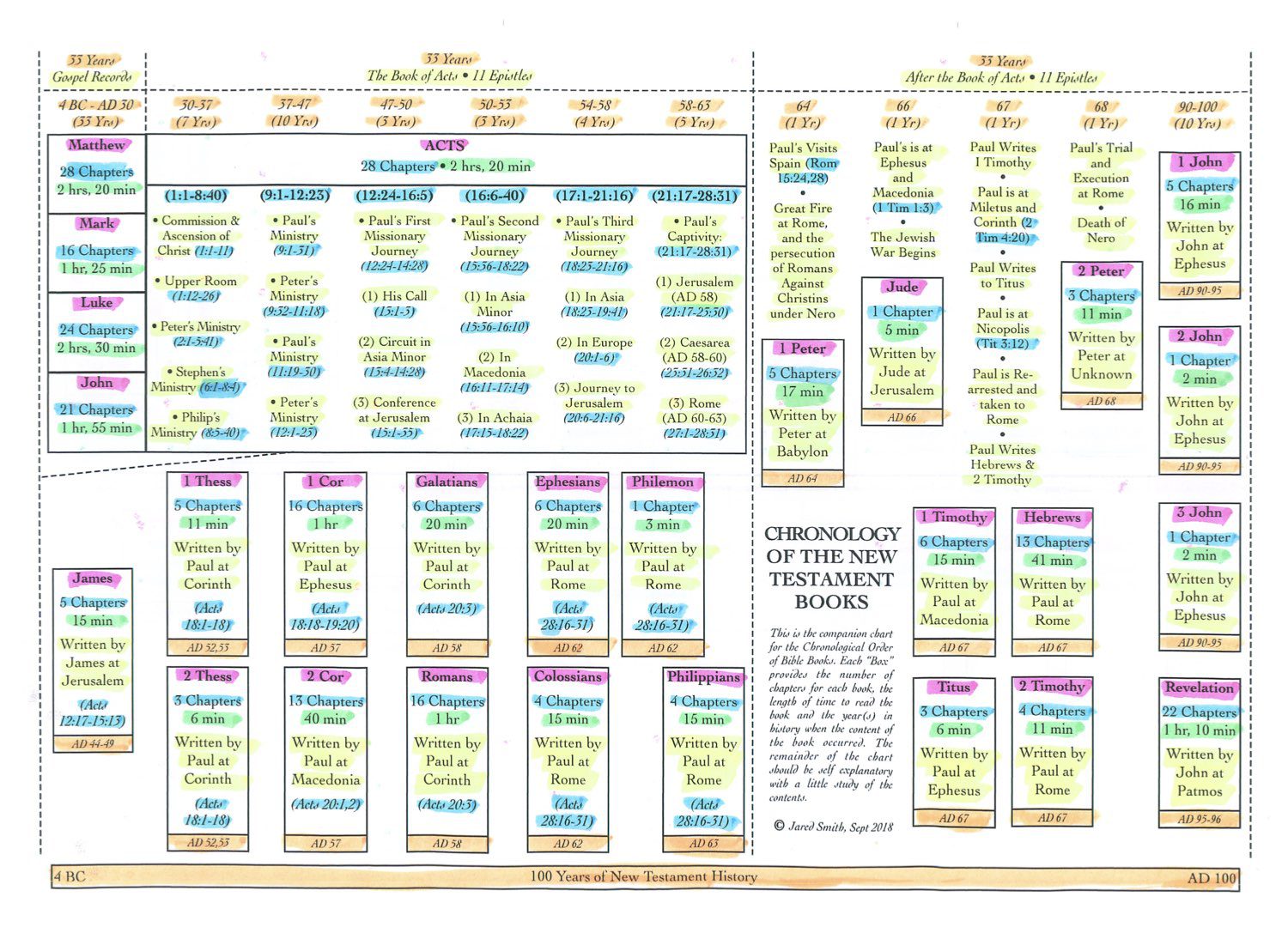
The Second Epistle Of John
The Background
The second letter of John was written between the years 90 and 95AD to a group of churches. The chart below provides a bird’s-eye view of the chronological order for the books of the New Testament.

John Gill, “Commentary On The New Testament Scriptures”:
“Though this epistle was called in question and gainsaid by some as authentic, as Eusebius says, yet there is no room to doubt of the authority of it; it was very early received into the canon of the Scripture, and is cited as such, and also as the Apostle John’s, by Irenaeus, who was a disciple of Polycarp, and an hearer of Papias, who were both disciples of the Apostle John; nor need there be any question as to his being the author of it. Eusebius indeed does say, it was a doubt whether it was the Apostle John’s or another of the same name; and some have since asserted, that it was written not by John the Evangelist, but by John the Presbyter of Ephesus, after the apostle; and this is thought to have some confirmation from the author of it being called an elder, or presbyter, which is judged not so agreeable to the Apostle John; though it should be observed, that Peter an apostle styles himself an elder, as John here does, (1 Peter 5:1), moreover, the above ancient writer, Irenaeus, expressly ascribes this epistle to John, the disciple of the Lord; and whoever compares some passages in this epistle with the former, particularly (2 John 1:5-7,9), with (1 John 2:7,8 3:23 5:3 4:1-3), will easily conclude, from the likeness of style and matter, that it is a genuine epistle of the Apostle John: the design of which is to exhort and encourage the lady he writes to, to continue in the truth and faith of the Gospel, and in love to God and his people, and to avoid false teachers and their doctrines.”
Robert Hawker, “Bible Chapter Summaries And Reflections”:
“It is highly probable, from the opening of this Epistle, that it was particularly directed to some one Person, and not the church at large. But still, from the contents of it, designed for general use. The word translated Lady, which corresponds to the Hebrew name Martha, might be a general name. But, certain it is, that it hath respect to every child of God, for it is connected with the title Elect.
Our chief concern is, to know, that the Writer of it was inspired to the service, and that he wrote it under the immediate influence and direction of the Holy Ghost. And this the testimony of the Church bears witness to, in every age, wherever the Lord hath blessed it in instruction to his people.
We have no particular date to it, neither of the place from whence it was written. But, neither are these things material. It is but short: yet, if the Lord teach in it, and by it, He can render it sweet. Lord! Let thy unction be upon it, and it will then send forth the fragrancy of Christ’s name, as the ointment poured forth!
Summary—The Apostle opens his Epistle, in calling the Person to whom he writes, Elect. He speaks of the joy he and his companions, who were Lovers of the Truth, found in the opinion they had of the grace the Lord had given her. He speaks of the Antichrist of the time, and warns her against all such teachers. He concludes with affectionate salutations.
Reflections—The Elders in the Church of Jesus may learn from this short, but gracious Epistle of John the elder, how to address the Elect, and with what words of comfort and consolation in Jesus, they are to be spoken to. And there is nothing more strengthening to the Church of God, than when old disciples speak to young ones, concerning God’s purposes in Christ, as manifested in his electing, converting, redeeming, establishing grace! It is blessedly said by one of old, “the righteous shall bring forth fruit in his old age, to shew that the Lord is upright.” I do not presume to say so much, but I humbly ask, did not the Lord the Spirit cause this Epistle to be sent by John to one Elect Lady, to be recorded in the Church, and handed down, through the several ages, to the present hour, on purpose to teach old saints, and especially faithful old ministers, how to speak to the elect children of Christ, in the several stations and characters as they stand in grace? Blessed and eternal Spirit! Be thou praised for this sweet morsel of thy holy scripture! Let it be a savor, in thine Almighty hand, for good. And let thy servant John’s ministry in it be owned and blessed of the Lord for good to all thy people, that though the Apostle be dead, he may be said yet to speak. Praised be God, Father, Son, and Holy Ghost, for all blessings in Christ. Amen.”
“All scripture is given by inspiration of God [inclusive of John’s second letter], and is profitable for doctrine, for reproof, for correction, for instruction in righteousness: that the man of God may be perfect, throughly furnished unto all good works.”—2 Timothy 3:16,17
Editor, Jared Smith
The Letter
The elder unto the elect lady and her children, whom I love in the truth; and not I only, but also all they that have known the truth; For the truth’s sake, which dwelleth in us, and shall be with us for ever. Grace be with you, mercy, and peace, from God the Father, and from the Lord Jesus Christ, the Son of the Father, in truth and love. I rejoiced greatly that I found of thy children walking in truth, as we have received a commandment from the Father. And now I beseech thee, lady, not as though I wrote a new commandment unto thee, but that which we had from the beginning, that we love one another. And this is love, that we walk after his commandments. This is the commandment, That, as ye have heard from the beginning, ye should walk in it. For many deceivers are entered into the world, who confess not that Jesus Christ is come in the flesh. This is a deceiver and an antichrist. Look to yourselves, that we lose not those things which we have wrought, but that we receive a full reward. Whosoever transgresseth, and abideth not in the doctrine of Christ, hath not God. He that abideth in the doctrine of Christ, he hath both the Father and the Son. If there come any unto you, and bring not this doctrine, receive him not into your house, neither bid him God speed: For he that biddeth him God speed is partaker of his evil deeds. Having many things to write unto you, I would not write with paper and ink: but I trust to come unto you, and speak face to face, that our joy may be full. The children of thy elect sister greet thee. Amen.
Paul The Apostle (?-68AD) was a sovereign grace Baptist preacher. He was appointed by Christ to serve as an Apostle, sent out to the wider regions of the world ministering the gospel primarily to the Gentiles. He is the author of fourteen New Testament letters—1 Thessalonians, 2 Thessalonians, 1 Corinthians, 2 Corinthians, Galatians, Romans, Ephesians, Colossians, Philemon, Philippians, 1 Timothy, Titus, Hebrews and 2 Timothy.






